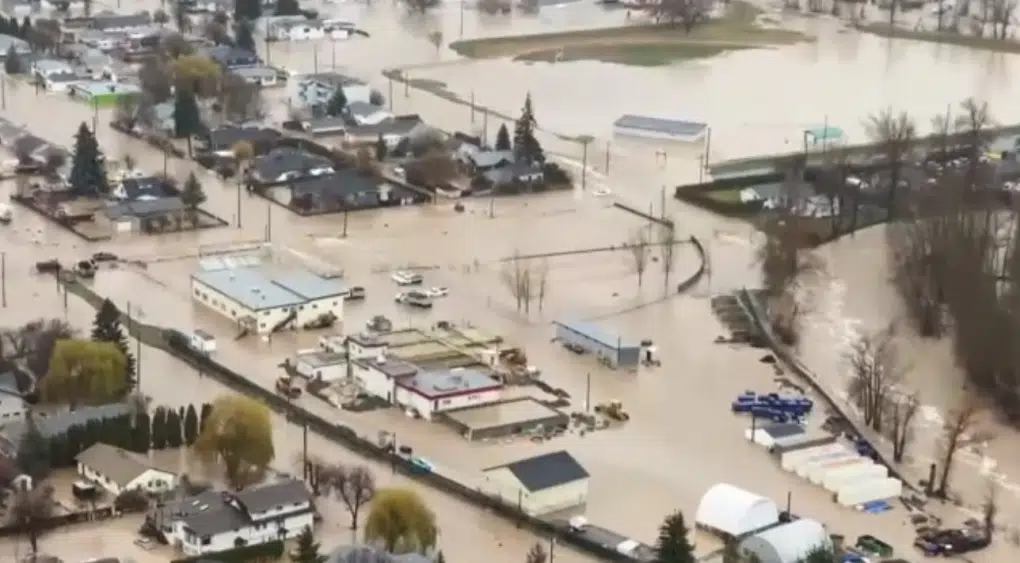
The flooded streets of Merritt as seen on Nov. 15. (Photo via Big Power Films)
The Mayor of Merritt says a wide-scale push is underway among local leaders in Toronto to push for better disaster funding as part of the Federation of Canadian Municipalities meetings underway there.
Mike Goetz says he and Princeton Mayor Spencer Coyne — who themselves testified before a Parliamentary committee earlier this month — have been scrambling to try to get an audience with the Prime Minister and other federal leaders, with no success.
However, he says the broader FCM is behind a push for a better disaster assistance model.
“There’s a unified voice to what we’re pushing for people and communities that have been affected. But there’s also a unified voice in communities that could be affected. They want preemptive protection. They want their dykes looked after. They want their forest floors taken care of.”
Goetz notes his communities and others in BC have faced challenges trying to secure support after-the-fact, and suggests the bureaucracy needs to be streamlined.
“A one-stop-shop where every community can apply for what they need. There needs to be a time-sensitive situation put on it, especially when the [Federal Emergency Preparedness] Minister [Bill Blair] comes through your community and promises he has your back, and then all of a sudden he doesn’t know who you are when you need him to respond.”
Goetz also suggests if Ottawa is unwilling to make the changes the FCM supports, he’d like to see the federal government divest its responsibilities to the provinces.
“[Emergency Management and Climate Readiness] Minister Ma and [Municipal Affairs] Minister Kang have been absolutely stellar dealing with our community and the problems that we’ve had. They’ve been there, they’ve toured the community, they’ve come through on their promises. I would feel much more comfortable with the provincial group looking after any kind of application funding.”
This year’s Federation of Canadian Municipalities Convention and Trade Show runs through Sunday in Toronto.
Kamloops is being represented at the event by City Councillor Nancy Bepple.
UPDATE: In response to our article, Federal Emergency Preparedness Bill Blair’s office has issued the following statement.
“In the event of a large-scale natural disaster, like the November 2021 floods in British Columbia, the Government of Canada provides financial assistance directly to provincial and territorial governments through the Disaster Financial Assistance Arrangements (DFAA) program.
The federal government can cover up to 90% of eligible costs, but provinces and territories are in full control of their recovery plans. They design, develop and deliver disaster financial assistance, deciding the amounts and types of assistance that will be provided to those that have experienced losses, and the DFAA program offers reimbursement as eligible expenses are incurred. Provinces and territories may request advance payments or interim payments to address early requirements of recovery and rebuild, and additional allocation for projects that include mitigative enhancements. Municipalities make application directly to the provinces and territories for support with their rebuilding efforts.
In the Economic and Fiscal Update that was released in December 2021, the Government of Canada allocated up to $5 billion as an initial outlay for the federal share of recovery costs under the DFAA program for disaster events that took place in British Columbia from 2020 to 2021. This amount includes the November 2021 floods, as well as damage from wildfires. In July 2022, Minister Blair $870 million out of 2021 Fall Economic Statement allocation to assist the province with recovery and rebuilding efforts following the November 2021 floods. In February 2023, Minister Blair announced a second advanced payment of over $556 million for the November 2021 floods. This brings the total amount of federal payments to the Province of British Columbia under the DFAA to over $1 billion for the November 2021 floods, specifically.
We recognize that there are ways this program can be improved to better serve Canadians and reduce the risks they experience by building greater resiliency. Last year, Minister Blair announced an advisory panel of experts from the public sector, academia, non-profit, Indigenous communities, and the private sector, and chaired by a former Deputy Minister of Emergency Management British Columbia. Minister Blair welcomed the release of their report earlier this year, and the recommendations that were made around how to improve the sustainability and long-term viability of disaster financing in Canada and improve DFAA program administration. In the most recent federal Budget, we committed $48.1 million over five years, starting in 2023-24, to identify high-risk flood areas and implement a modernized DFAA program which would incentivize mitigation efforts. Additionally, it proposes to provide $31.7 million over three years to Public Safety Canada and the Canada Mortgage and Housing Corporation to work with the Department of Finance Canada to stand-up a low-cost flood insurance program, aimed at protecting households at high risk of flooding and without access to adequate insurance.
British Columbians have strong partners in all orders of government, and we will continue to work with the Province and municipal leaders as the recovery process continues to ensure that communities build back in a stronger, more resilient way.”













